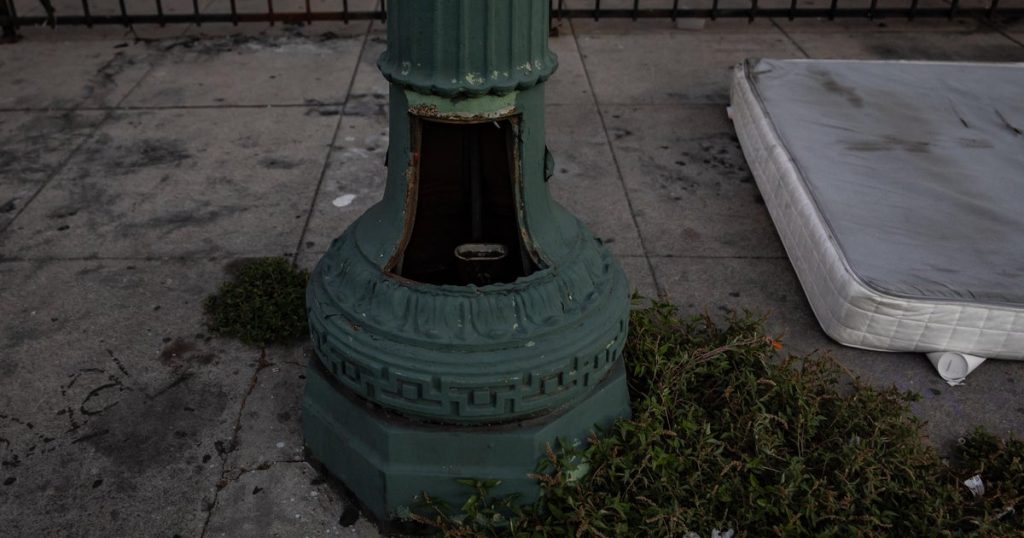As surging copper wire thefts are leaving many Los Angeles communities in the dark, a new statewide metal theft law set to kick in next year is aimed at recyclers who buy the stolen metal.
Los Angeles city leaders, law enforcement and business leaders called on Gov. Gavin Newsom to sign Assembly Bill 476 as copper wire theft has cost communities not only money, but safety.
The Sixth Street Bridge in downtown Los Angeles, originally called the “Ribbon of Light,” is a glaring example, as it sits in darkness with seven miles of copper wire stolen and stripped from the 2023-built bridge.
While the stolen copper is valued at $11,000, repairs to rewire it for lighting are estimated to cost over $2.5 million – and have yet to be completed.
Similar wire theft crime scenes play out throughout the county, including around the Cahuenga Pass. Joy Taylor says her streetlights have been out for eight months, since February.
“I not only worry about cars not seeing us, but we have a lot of wildlife in this neighborhood, and there’s coyotes that are coming through the area,” Taylor said.
In Encino, five streetlights are out of commission on a single block, leaving one couple to alter their evening walks with their aging father because of it.
“Unfortunately, because of the cracks in the sidewalk, my dad’s 83 years old, he can’t see, and you know, myself as well, I will trip on the cracks. You just can’t walk at night, you can’t when it’s pitch black,” Elayne said.
CBS News California Investigates obtained and analyzed city data and found that there have been more than 37,000 streetlight repair requests made so far in 2025. As of September, more than half are still waiting for service.
The Bureau of Street Lighting said through an email statement that 15% of the system is affected by outages.
LA County District Attorney Nathan Hochman said that broken streetlights have life and death consequences. He noted the downtown Los Angeles shooting death of actor Johnny Wactor.
“He got killed because three individuals were trying to steal his catalytic converter. But why did they choose Johnny Wactor’s car at 3 a.m. at that exact spot? Because the streetlights were out — it was dark,” Hochman said.
The Bureau says nearly half of its service requests are due to wire theft, and the other half are routine maintenance. This leads to a nine to 12-month period before repairs can be made, as there are less than 200 field staff to cover the city’s quarter of a million streetlights.
Los Angeles Councilmember Nithya Raman represents the district that includes the Cahuenga Pass and she said she is constantly getting calls about broken streetlights. “To me, it’s unacceptable that it takes up to a year to fix a broken streetlight,” Raman said.
She’s calling for an update to property assessment rates, to fund streetlight maintenance as the fees haven’t been adjusted since the 90s.
Neighbors in the Cahuenga Pass have taken matters into their own hands by pooling money to install their own streetlights. Residents Martha Carr and Joy Taylor said they aren’t waiting for the city to come to the rescue, and instead are subsidizing a city service with two motion-activated lights.
“Well, in a strange way, I felt empowered that I was able to do something myself, but I shouldn’t have to,” Carr said.
Mayor Karen Bass’ Office responded by email, saying the city is “embracing new and innovative technologies like solar lighting,” moving away from copper wire. “Mayor Bass has begun that work as hundreds of solar streetlights have been installed,” the Mayor’s Office wrote.
Assembly member Mark González authored AB 476, stating that “Copper wire theft is not a victim-less crime.”
The bill puts more responsibility on junk dealers when purchasing scrap metal, leaving thieves with fewer options when selling. Buyers will be required to verify the seller’s identity and lawful ownership. Certain scrap metal from streetlights and traffic signals will be illegal to possess, and the bill also increases penalties for recyclers who purchase materials that belong to public entities without ensuring the seller has proper authorization to do so.
“Every stolen wire is more than metal ripped from the ground; it’s light ripped from our communities,” González said.
The city is also working on a Metal and Wire Theft Reward Program, where rewards of $5,000 would be offered for information leading to felony grand theft charges and $1,000 for misdemeanor charges involving city-owned metal thefts, including copper wiring, plaques, streetlight parts and more.


